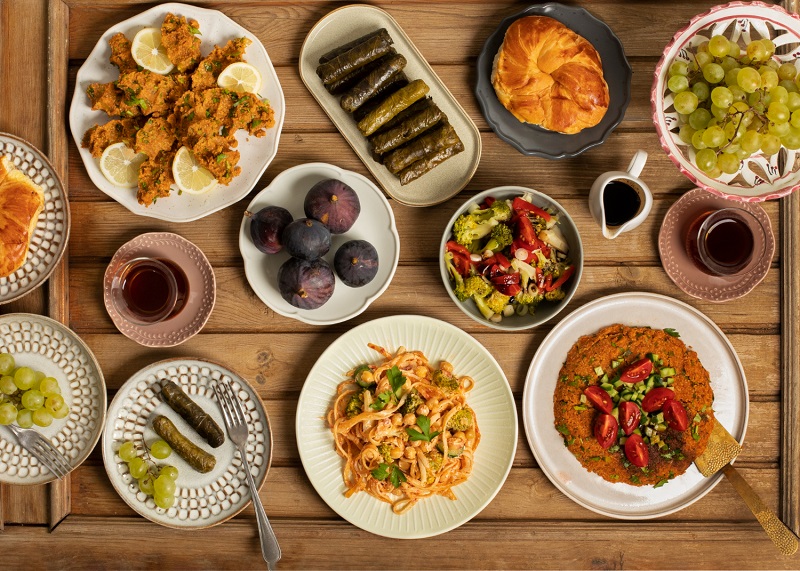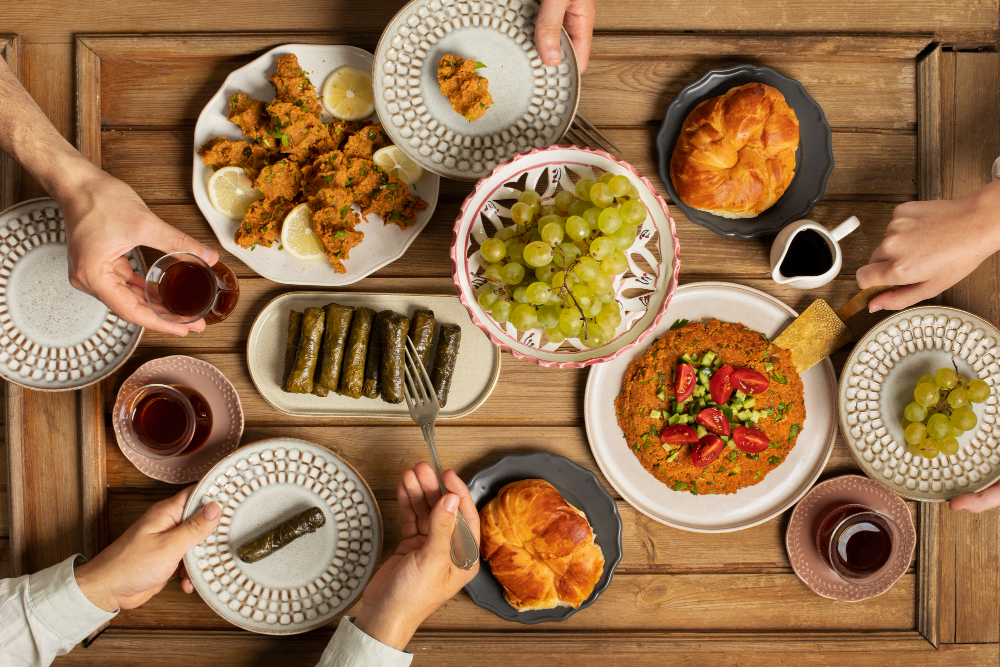Ramadan is a sacred time for Muslims around the world, marked by fasting from dawn till dusk. It’s also a period where many seek to improve their health and well-being, including weight loss. However, the Ramadan Weight Loss Diet Plan can be challenging, and it’s important to have a well-thought-out plan to stay healthy while achieving your weight loss goals.
How to Lose Weight During Ramadan 2024
Losing weight during the month of Ramadan can be a challenging and rewarding journey for those who are looking to shed some extra pounds. The holy month of Ramadan is considered as a time of spiritual reflection, fasting, and self-discipline. It is also an excellent opportunity to adopt healthy habits and work towards achieving your Ramadan Weight Loss Diet Plan goals.
One of the key aspects of losing weight during Ramadan is to have the right approach. This can involve making changes to your eating habits, exercise routine, and overall lifestyle. For instance, it is important to consume a balanced and nutritious diet during the non-fasting hours to ensure that your body gets the required nutrients. It is also crucial to stay hydrated and avoid sugary and high-calorie drinks. Ramadan Weight Loss Diet Plan:
In addition to this, incorporating regular exercise into your routine can help you burn calories and maintain your weight loss goals. Whether it’s a brisk walk or a light workout, staying active during Ramadan can help you feel energized and motivated throughout the day.
Overall, losing weight during Ramadan requires dedication, commitment, and a positive mindset. With the right approach and mindset, you can make the most of this holy month to achieve your weight loss goals and improve your overall health and well-being.
- Ramadan can be an opportunity to lose weight
- Adopting healthy habits is important
- Eating a balanced and nutritious diet during non-fasting hours is crucial
- Staying hydrated and avoiding sugary and high-calorie drinks is recommended
Why Ramadan Is the Best Time to Start Your Weight Loss Journey
Ramadan offers a unique opportunity for individuals looking to embark on a weight loss journey. Here are some reasons why Ramadan is the best time to start your weight loss journey:
- Fasting: Fasting during Ramadan can help reset your eating habits and break unhealthy patterns. It can also improve your metabolism and promote fat burning.
- Spiritual Benefits: Ramadan is not just about abstaining from food and drink; it’s also a time for spiritual reflection and self-discipline. This mindset can help you stay motivated and focused on your weight loss goals.
- Community Support: Ramadan is a time when communities come together to break their fast and share meals. This sense of community support can be motivating and inspiring on your weight loss journey.
- Increased Self-Control: Fasting teaches self-control and discipline, which are essential for successful weight loss. By practicing self-control during Ramadan, you can develop healthier eating habits for the long term.
- Focus on Health: Ramadan encourages a focus on health and well-being. This can inspire you to make healthier food choices and prioritize your physical and mental health.
Overall, Ramadan provides a conducive environment for individuals looking to lose weight. With the right mindset and approach, you can make significant progress towards your weight loss goals during this holy month.
5 Best Ways to Lose Weight During Ramadan
1. Drink Water
During the non-fasting hours, it’s crucial to stay hydrated. Water helps in digestion and can help you feel full, reducing the chances of overeating during the non-fasting hours.
- Stay hydrated during non-fasting hours.
- Water helps in digestion.
- Drinking water can help you feel full.
- Feeling full can reduce the chances of overeating during non-fasting hours.
2. Exercise is Key
While it may be tempting to skip exercise due to fasting, maintaining a regular exercise routine can help you burn calories and stay fit. Try to schedule your workouts during the non-fasting hours for optimal results.
- Skipping exercise during fasting may be tempting, but it’s not recommended.
- Maintaining a regular exercise routine can help you burn calories and stay fit.
- Schedule your workouts during the non-fasting hours for optimal results.
3. Stay Away from Fat, Sugar, and Salt
These three ingredients can contribute to weight gain and are often found in processed foods. During Ramadan, focus on whole foods that are rich in nutrients and low in these harmful ingredients.\
- Processed foods often contain three ingredients that can contribute to weight gain
- Ramadan is a good time to focus on whole foods
- Whole foods are rich in nutrients and low in harmful ingredients
4. Add Protein to Every Meal
Protein helps in muscle repair and growth, which is crucial during a weight loss journey. Include sources of lean protein such as chicken, fish, lentils, and beans in your meals.
- Protein is essential for muscle repair and growth during weight loss
- Include sources of lean protein like chicken, fish, lentils, and beans in meals
5. Eat More Vegetables
Vegetables are low in calories and high in nutrients, making them a perfect addition to your Ramadan Weight Loss Diet Plan. Aim to fill half your plate with vegetables during meals.
- Vegetables are an essential part of a healthy Ramadan diet.
- They are low in calories and high in nutrients.
- Make sure to include them in your meals.
- Aim to fill half of your plate with vegetables.
Free Ramadan Weight Loss Diet Plan
Sehri
- 1 Whole-wheat Roti
- 1 Vegetable Omelet
- 1 Chicken Kebab
- 1/4 c Yogurt
- 2 Dates
- 1/2 c Tea (optional)
Aftar
- 2 Dates
- Water (you can add mint, lemon juice, and honey)
- 1 Bowl Fruit Salad (without sugar) or Channa Chaat
Dinner
- 1/2 c Mix Vegetable Salad
- 1/4 c Raita
- Steamed Chicken, Daal, or any other form of protein
- 1 Whole-wheat roti or 1 c Rice
It is crucial to understand that any diet plan may not be appropriate for everyone, especially individuals with underlying medical conditions such as high blood pressure, diabetes, kidney problems, etc. These health conditions require a specific dietary approach that may differ from a general diet plan. Therefore, it is strongly recommended to consult a licensed and registered Dietitian before starting a new diet regimen.
A qualified Dietitian can assess your health condition and provide you with a personalized diet plan that meets your nutritional needs while taking into account your medical history. This step is essential to ensure that you do not put your health at risk and achieve your health goals safely and sustainably.
In conclusion, losing weight during Ramadan is possible with the right plan and mindset. By following these tips and guidelines, you can achieve your weight loss goals while staying healthy and energized throughout the holy month.
Resourses
- https://en.wikipedia.org/wiki/Ramadan
- https://ing.org/resources/for-all-groups/calendar-of-important-islamic-dates/ramadan-information-sheet/
- https://www.brandeis.edu/spiritual-life/resources/guide-to-observances/ramadan.html
- https://en.wikipedia.org/wiki/Ramadan_(calendar_month)
- https://islamic-relief.org/ramadan/
FAQ
How can one effectively lose weight during Ramadan?
One can effectively lose weight during Ramadan by maintaining a calorie deficit, consuming nutritious foods during non-fasting hours, staying hydrated, and avoiding overeating during iftar and suhoor.
Is it possible to lose 10 kg in Ramadan?
While it is possible to lose weight during Ramadan, aiming to lose 10 kg in a single month may not be realistic or healthy. It’s important to focus on gradual and sustainable weight loss.
How can I lose weight during Sehri (pre-dawn meal)?
To lose weight during Sehri, one can consume a balanced meal that includes complex carbohydrates, proteins, and healthy fats to help stay full longer and avoid overeating later in the day.
How can someone lose weight during fasting?
To lose weight during fasting, one can focus on eating nutrient-dense foods, controlling portion sizes, and incorporating physical activity into their daily routine.
Is it possible to lose 30 kg in Ramadan?
Losing 30 kg in a single month is not recommended as it could be unsafe and unsustainable. Gradual weight loss over time is healthier and more achievable.
Can fasting in Ramadan help in losing body fat?
Fasting in Ramadan can contribute to weight loss, including body fat, especially if one maintains a balanced diet and avoids overeating during non-fasting hours.
Why might someone not be losing weight in Ramadan?
Several factors can contribute to not losing weight in Ramadan, such as consuming high-calorie foods, not staying hydrated, and not engaging in enough physical activity.








